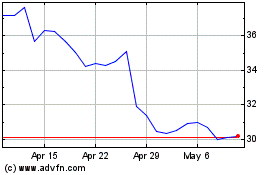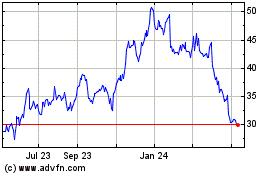Chinese internet firm to pay $8.6 billion for stake in Finnish
videogame maker
By Juro Osawa and Sarah E. Needleman
Tencent Holdings Ltd. and its partners will pay $8.6 billion for
the Finnish maker of "Clash of Clans," a deal that will catapult
the Chinese internet company to the top of the white-hot market for
games played on smartphones and tablets.
The deal for Supercell Oy, Tencent's biggest-ever acquisition,
reinforces the company's position as the world's biggest videogame
publisher by revenue. It also highlights the Shenzhen-based
company's ambitions beyond China's borders.
Tencent and its partners are buying an 84.3% stake in Supercell
from Japan's SoftBank Group Corp. and the startup's current and
former employees, the companies said Tuesday. The deal values
closely held Supercell at $10.2 billion -- nearly double its
valuation a year ago.
Tencent is little known in the West, but the company's market
capitalization was about $207 billion based on Tuesday's closing
price, more than that of Oracle Corp. and Intel Corp.
Online games accounted for more than half of Tencent's $15
billion in revenue last year. "We are very bullish on the [mobile
games] market," Tencent President Martin Lau said on a conference
call.
Global revenue from mobile games is expected to rise 21% to
about $37 billion this year, eclipsing console and
personal-computer games, according to market-research firm Newzoo
BV.
While the market is lucrative, it can be challenging. The Apple
Inc. and Google Inc. app stores are stuffed with thousands of games
vying for attention. Much of the money, though, flows through a
handful of leading publishers: Supercell, Machine Zone Inc. and
King Digital Entertainment PLC.
Those companies succeed by making games free instead of charging
for each download. As the games spread to millions of devices,
developers have continually upgraded them with new boards and
challenges, all the while mining revenue through in-game purchases
of virtual currency and other digital goodies that enhance the
experience.
Playing games "is one of the primary reasons why consumers are
using their mobile devices," Pacific Crest Securities analyst Evan
Wilson said. "It's also one of the things that consumers are most
willing to pay for on their phones."
Success has been rewarded. Activision Blizzard Inc. paid $5.9
billion to acquire King, which built its fortunes on the "Candy
Crush" franchise. Supercell earned $779.1 million last year; it
released only its fourth game, "Clash Royale," earlier this
year.
Privately held Machine Zone's "Mobile Strike" and "Game of War:
Fire Age" are the No. 1 and 2 games on Apple's top-grossing U.S.
chart. "Machine Zone would be an attractive target for their
technology and high spending user base," Patrick Walker, an analyst
at research firm EEDAR, said. "They've invested in elaborate
systems for engaging players through social interaction," such as
software for translating languages.
Mobile-game companies are commanding premiums because only a few
have figured out how to build lasting franchises by convincing
loyal fans to repeatedly dig into their pockets in 99-cent
increments. Buying already successful developers offers a fast
track for companies to leapfrog to the top of the app-store charts,
said Richard Greenfield, an analyst at investment bank BTIG.
By teaming up with Tencent, Supercell gains access to the WeChat
and Mobile QQ messaging apps, which Tencent uses to distribute
mobile games. WeChat is China's most popular messaging app with 762
million monthly active users.
Tencent said it would help Supercell's games find more users in
China. Supercell Chief Executive Ilkka Paananen said on a
conference call Tuesday that his company is working on integrating
its gaming platforms into Tencent's WeChat and other social
platforms in China.
Tencent's $8.5 billion in game revenue in 2015 already made it
the world's biggest game publisher, according to Newzoo. Its mobile
success has largely been domestic. Buying Supercell hooks it into
the burgeoning number of mobile-game players around the world.
With Supercell on board, Tencent is set to grab 13% of the
nearly $100 billion global game market, according to Newzoo.
"Supercell can become a steppingstone to grow its position in the
West," Newzoo CEO Peter Warman said.
Beyond publishing, Tencent has been ramping up its investment in
another hot corner of the game industry, e-sports, whose live
broadcasts and professional events attract millions of dedicated
online viewers in China, the U.S. and South Korea.
Tencent became a global e-sports player thanks to its 2011
acquisition of Los Angeles-based Riot Games Inc., the developer of
the hit combat game "League of Legends." Last year, "League of
Legends" was the world's top-grossing PC game, generating $1.63
billion in revenue, according to research firm SuperData.
The Supercell acquisition fits with Tencent's push into
competitive gaming. Supercell has held live tournaments with its
"Clash Royale" game. The deal also follows Tencent's other smaller
moves in recent years to expand its mobile-games business abroad,
including buying minority stakes in San Francisco's Glu Mobile Inc.
and Japan's Aiming Inc.
Whether the Supercell deal can become a springboard for
Tencent's global expansion depends on how well the two companies
can work together, given their different cultures, analysts
said.
"Under SoftBank we enjoyed a great deal of independence," said
Mr. Paananen Tuesday. "I'd like to think of Supercell as a group of
190 entrepreneurs rather than a company," he said.
Tencent, by contrast, is a sprawling internet group with over
30,000 employees, many based in China. Mr. Lau, Tencent's
president, promised Tuesday to preserve Supercell's culture and
give the company "all the independence it wants." Supercell's
headquarters will remain in Helsinki.
Tencent is teaming up with financial investors to purchase the
stake. Because the purchase is occurring in stages, Tencent has
sufficient funds to pay for the initial purchase, people familiar
with the matter said. The Chinese internet giant is also planning
to raise additional debt secured by Supercell's assets to help
cover some of the acquisition costs, they said.
The deal, which is expected to close in the third quarter, is
subject to regulatory approvals in the U.S., Europe and South
Korea, Tencent said.
--Rick Carew and Wayne Ma in Hong Kong, Sarah E. Needleman in
New York, and Matthias Verbergt in Stockholm contributed to this
article.
Write to Juro Osawa at juro.osawa@wsj.com
(END) Dow Jones Newswires
June 22, 2016 02:52 ET (06:52 GMT)
Copyright (c) 2016 Dow Jones & Company, Inc.
Intel (NASDAQ:INTC)
Historical Stock Chart
From Mar 2024 to Apr 2024

Intel (NASDAQ:INTC)
Historical Stock Chart
From Apr 2023 to Apr 2024
